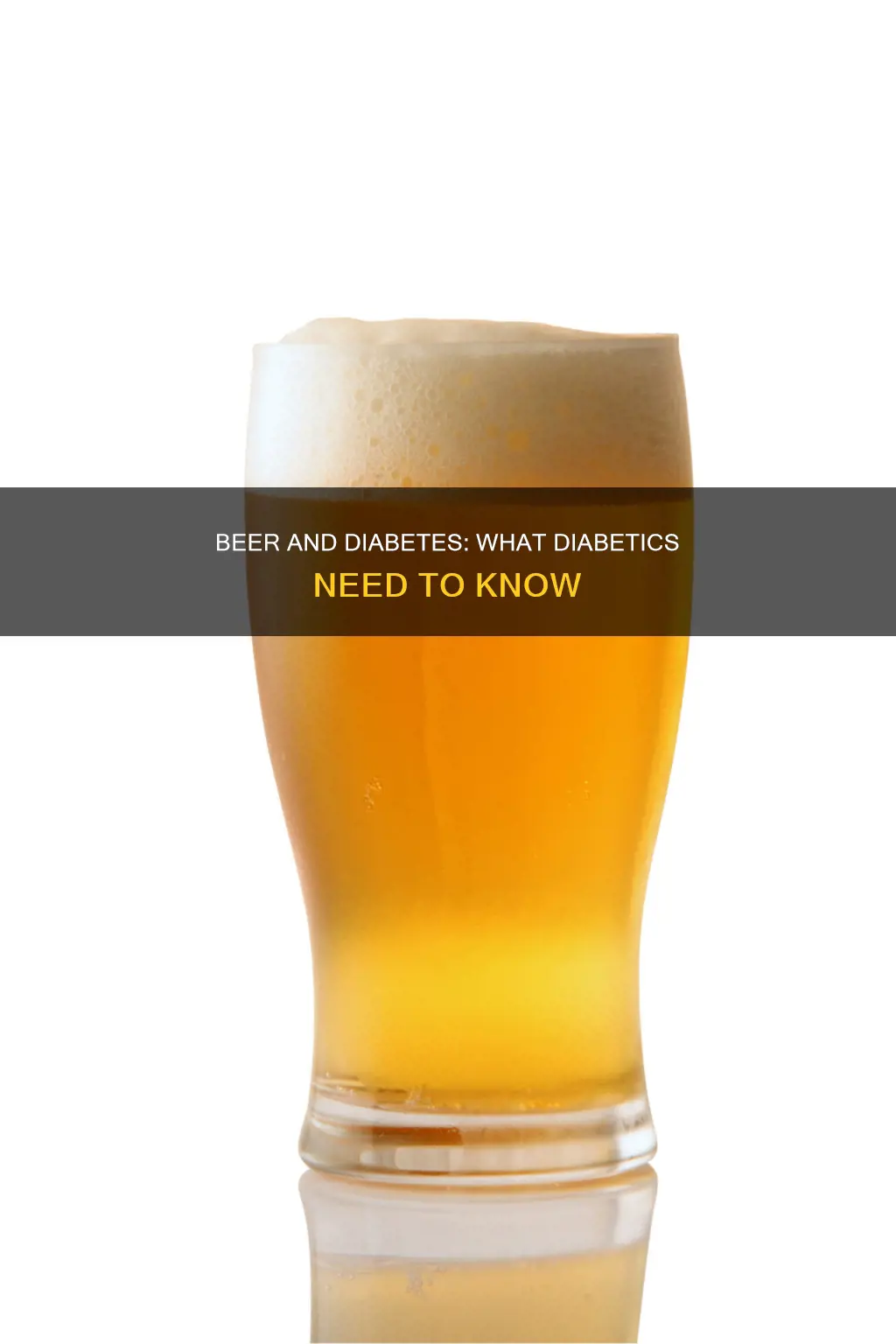
People with diabetes do not need to abstain from alcohol entirely, but they should be aware of how it can affect their body and how to manage this. Alcohol can cause blood sugar levels to rise or fall, and it can also affect diabetes medication. It is recommended that people with diabetes follow the same guidelines as the general population: no more than one drink per day for women and up to two drinks per day for men. However, drinking on an empty stomach is not recommended, as it can lead to hypoglycemia. Beer and sweetened mixed drinks are high in carbohydrates, which can raise blood sugar levels. Additionally, alcoholic drinks tend to be high in calories, which can lead to weight gain and make it more difficult to manage diabetes.
What You'll Learn

Beer and sweet wines contain carbohydrates and may raise blood sugar
Beer and sweet wines are high in carbohydrates, which can cause blood sugar levels to rise. This is particularly true of sweet dessert wines, which pack 14 grams of carbohydrates into a tiny 3.5-ounce glass. A standard 5-ounce glass of wine contains roughly 4 grams of carbohydrates. Beer also contains carbohydrates, with a range of 3.2 to 7 grams of carbs in a 12-ounce serving, depending on the brand.
The liver stabilizes glucose levels by storing carbohydrates and releasing them into the bloodstream as needed. When you consume alcohol, your liver needs to break it down, and in doing so, stops releasing glucose. This can cause your blood sugar level to drop quickly, putting you at risk of hypoglycemia (low blood sugar). The risk of hypoglycemia is further increased if you drink on an empty stomach, as there is no food to help maintain normal blood sugar levels.
To prevent hypoglycemia, it is recommended that you do not drink on an empty stomach and that you have food on hand while drinking. It is also important to pace yourself, sticking to no more than one drink per hour and no more than three or four drinks for the day. Additionally, drinking plenty of water will help to keep you hydrated.
It is worth noting that while beer and sweet wines may raise blood sugar, other alcoholic drinks such as spirits, dry wines, and Prosecco have minimal carbohydrates and may be a better choice for those concerned about blood sugar levels.
Beer and Athletes: A Performance-Draining Combination?
You may want to see also

Alcohol stimulates appetite, which may affect blood sugar control
Alcohol can affect your appetite and blood sugar control in several ways. Firstly, alcohol can lower inhibitions and impair judgment, leading to decreased defences when it comes to portion control and making healthy food choices. This can result in overeating and consuming more calories than intended. Additionally, alcohol may influence hormones that regulate satiety or the feeling of fullness. For example, it can inhibit leptin, a hormone that suppresses appetite, and glucagon-like peptide-1 (GLP-1), a hormone that inhibits food intake.
Furthermore, alcohol may stimulate nerve cells in the brain's hypothalamus, which can increase appetite and trigger a sharp rise in appetite, leading to overeating. This effect has been observed in animal studies, where alcohol activated neurons typically fired during starvation, resulting in increased food intake. The impact of alcohol on the brain's hunger signals could explain why many people experience an increased appetite after consuming alcohol.
The impact of alcohol on blood sugar control is also significant. Alcohol competes with the liver's ability to produce glucose when blood sugar is low, especially if you are taking insulin or other anti-hyperglycemic medications. This can lead to dangerously low blood sugar levels, known as hypoglycemia, which can persist for up to 24 hours after drinking. Additionally, the symptoms of hypoglycemia, such as slurred speech, drowsiness, and confusion, can be similar to the signs of intoxication, making it challenging to distinguish between the two conditions. Therefore, it is essential for individuals with diabetes to carefully monitor their blood sugar levels when consuming alcohol and to ensure they do not drink on an empty stomach.
In summary, alcohol can stimulate appetite and affect blood sugar control by influencing hormones, activating hunger signals in the brain, impairing judgment, and interfering with the liver's ability to regulate blood glucose levels. These effects can lead to overeating, weight gain, and potentially dangerous drops in blood sugar levels for individuals with diabetes. Therefore, it is crucial to consume alcohol in moderation and be mindful of its impact on appetite and blood sugar control.
Beer and Colonoscopy: What You Can and Can't Drink Post-Procedure
You may want to see also

Alcohol may affect judgement, leading to poor food choices
While drinking in moderation is generally considered safe for diabetics, alcohol can affect people's judgment, leading to poor food choices. This is especially true if you are drinking on an empty stomach. Alcohol stimulates your appetite, which can cause you to overeat and may affect your blood sugar control.
Drinking alcohol can also make it difficult to recognise the symptoms of low blood sugar, as some of these symptoms, such as slurred speech, drowsiness, confusion, or difficulty walking, are similar to the signs of being drunk. This can be dangerous if you are experiencing hypoglycemia, as you may not realise that your blood sugar levels are dropping to dangerously low levels.
To avoid this, it is important to drink in moderation and to always have food with your alcohol. It is also a good idea to check your blood sugar levels regularly before, during, and after drinking. This will help you to manage your blood sugar levels and avoid the risks associated with hypoglycemia.
Additionally, it is important to be aware that alcoholic drinks can contain a lot of calories, which can lead to weight gain and make it more difficult to manage diabetes. Beer and sweetened mixed drinks, for example, are high in carbohydrates and can raise blood sugar levels.
Shingles and Beer: A Safe Mix?
You may want to see also

Alcohol can interfere with diabetes medication
Additionally, alcohol can interact with certain diabetes medications. For example, some diabetes pills, such as sulphonylureas and meglitinides, lower blood glucose levels by stimulating the pancreas to produce more insulin. Combining these medications with alcohol can further decrease blood sugar levels, leading to dangerous hypoglycaemia. It's important to discuss your medication and alcohol consumption with your doctor to ensure your safety. They can advise you on which medications are best for you and provide guidance on how much alcohol, if any, is safe for you to consume.
Furthermore, alcohol can impair your liver's ability to produce glucose. Therefore, it's recommended to test your blood sugar levels before consuming alcohol to ensure they are within a safe range. Alcohol can also cause hypoglycaemia for up to 12 hours after consumption, so it's important to continue monitoring your blood sugar levels during this period.
BYOB: Beer Gardens and Personal Alcohol Consumption
You may want to see also

Alcohol may increase blood pressure
People with diabetes do not need to abstain from alcohol entirely. In fact, some studies suggest that light drinking (no more than one to two drinks a day) may be beneficial for people with diabetes. However, it is important to be aware of how alcohol can affect your body and how to manage these effects.
One of the main concerns regarding alcohol consumption for people with diabetes is the risk of hypoglycemia, or low blood glucose. This occurs because alcohol interferes with the liver's ability to maintain blood glucose levels. The liver, which usually stabilizes glucose levels by storing carbohydrates and releasing them into the bloodstream, prioritises metabolising alcohol over maintaining blood glucose. This can lead to dangerously low blood sugar levels, especially if you are on insulin or other anti-hyperglycemic medications. Alcohol can also impair your judgement, making it harder to recognise the symptoms of low blood sugar. Therefore, it is important to take precautions such as not drinking on an empty stomach, always having food nearby while drinking, and regularly monitoring your blood sugar levels.
Another important consideration is that alcohol may increase blood pressure. Excessive alcohol intake is associated with raised blood pressure, which can have negative health consequences. To maintain a healthy blood pressure, it is recommended to limit alcohol consumption to no more than one drink per day for women and up to two drinks per day for men. These guidelines are the same for people with and without diabetes.
In addition to the effects on blood sugar and blood pressure, alcohol can also impact your weight. Alcoholic drinks can contain a significant number of calories, which can contribute to weight gain. Additionally, drinking can make it more challenging to manage your carbohydrate intake, as alcohol does not require insulin to provide energy to the body.
It is important to note that the effects of alcohol on individuals with diabetes can vary. If you have diabetes and are considering drinking alcohol, it is always best to consult with your healthcare provider. They can provide personalised advice and help you understand how alcohol may affect your specific condition and any medications you are taking.
Alcoholics and Ginger Beer: Is It Safe to Drink?
You may want to see also
Frequently asked questions
Yes, diabetics can drink beer, but they need to be aware of how alcohol affects their body and how to manage this. It is recommended that diabetics follow the same alcohol consumption guidelines as the rest of the population: no more than one drink a day for women and up to two drinks a day for men.
Drinking beer can cause low or high blood sugar levels, depending on the amount consumed, the stomach status (empty or full), and any medications the diabetic is taking. Beer is also high in carbohydrates and calories, which can lead to weight gain and make it more difficult to manage diabetes.
A daily drink may improve blood glucose management and insulin sensitivity. Moderate drinking is also associated with a reduced risk of cardiovascular disease.
Diabetics should avoid drinking on an empty stomach and monitor their blood sugar levels regularly before, during, and after drinking. It is also important to stay hydrated and be aware of the symptoms of low blood sugar, as alcohol can mask these symptoms.







